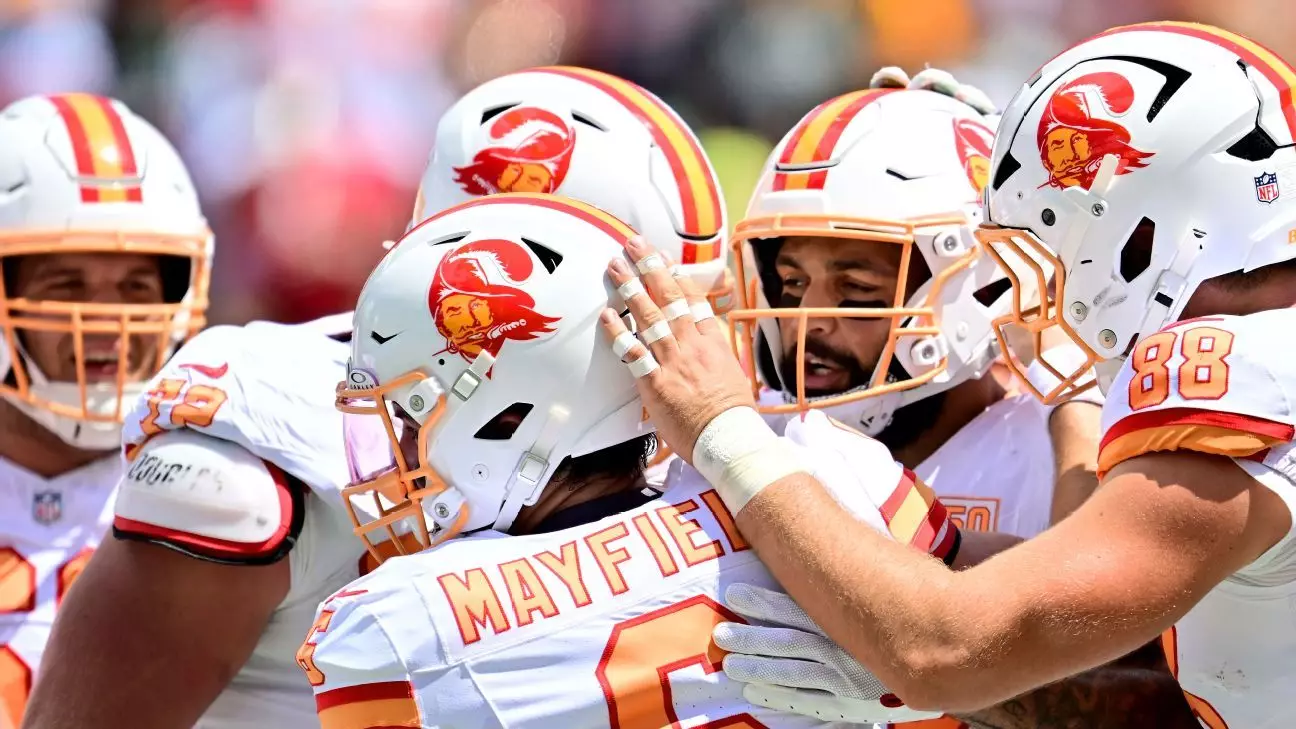In an era where professional athletes are often viewed through the lens of their statistics and highlight reels, Baker Mayfield’s recent performance serves as a potent reminder that mental toughness and resilience are just as vital as physical talent. His comments after a narrow 29-27 victory reflect a mindset rooted in personal history and rivalries that invigorate his competitive spirit. When Mayfield highlighted the significance of facing the Jets’ defensive coordinator, Steve Wilks, the man who once cut him from the Carolina Panthers, he was not merely firing a verbal shot but asserting that triumph often stems from personal vendettas and emotional investments. This attitude exemplifies a broader truth: top-tier athletes harness their past setbacks not as scars but as fuel for future success. Such a perspective transforms high-pressure games from mere competitions into personal duels that elevate performance and ignite a sense of purpose.
This emphasis on internal motivation suggests that Mayfield’s leadership style is unapologetically intense and deeply personal. When players like Emeka Egbuka and Ben Bredeson speak of Mayfield as a “natural born leader” who embodies a willingness to “die on the field,” they reveal an athlete who thrives in adversity. It’s this high level of emotional engagement that separates good players from great ones. Mayfield’s ability to channel past disappointments into sharp focus during crucial moments breathes life into the narrative of perseverance. His example challenges contemporary sports culture to prioritize mental fortitude over mere physical prowess — a vital lesson in a sport where the mental game is as important as the physical.
Overcoming Adversity: A Testament to Grit and Adaptability
Mayfield’s journey has been a rollercoaster punctuated by injuries, team changes, and doubts about his potential. His resurgence with the Tampa Bay Buccaneers defies the narrative of a fallen quarterback destined for mediocrity. The pivotal moment was his ability to deliver winning drives in critical situations—an achievement that places him in illustrious company alongside NFL stars like Foles, Ryan, and Tannehill. Such a feat underscores his skill in high-pressure scenarios, emphasizing that mental toughness combined with experience can turn the tide of close games.
What makes Mayfield’s story particularly compelling is his perseverance through setbacks that could have ended his career or at least dampened his confidence. Being demoted in Carolina and effectively dismissed from the Panthers could have been crushing, yet he emerged resilient, embracing a role that many contenders might dismiss as a last resort. His on-the-field performance and leadership prove that adaptability and grit are paramount in the NFL’s cutthroat environment. Meanwhile, his ability to lead a team with a battered offensive line and incomplete receiving corps shows an intangible quality: an unwavering belief in oneself and the team, even when external circumstances are bleak.
This resilience isn’t just about individual success; it’s a testament to the transformative power of mindset in sports. Mayfield’s journey exemplifies that setbacks are temporary, and perseverance can redefine potential. His story encourages players and fans alike to view adversity as an opportunity to forge character and resilience—traits that endure beyond the football field and into life’s broader challenges.
Revitalization and the Power of Confidence
The recent victories demonstrate how confidence, when coupled with relentless effort, can produce extraordinary results. Mayfield’s leadership embodies a daring approach to football, where trying and failing are stepping stones for eventual victory. His inspired plays, especially in clutch moments, reflect a mindset unshaken by past failures or external doubts. The remarkable fact that Tampa Bay has become one of the few teams to win three straight close games underscores the team’s mental toughness and resilience—traits rooted in Mayfield’s unwavering belief in the possibility of victory.
Furthermore, the narrative highlights an important shift in football culture: valuing emotional intelligence and mental toughness alongside traditional skills. Mayfield’s ability to stay calm under pressure, to motivate his teammates, and to seize moments in intense games speaks directly to the importance of leadership qualities that transcend athletic ability. His journey from being cut to becoming a game-winning hero challenges the notion that success is solely based on physical talent. Instead, it emphasizes that mental resilience, confidence, and the capacity to capitalize on opportunities define the true champions.
The narrative also casts light on the underestimated influence of experience and adaptability. With key injuries in the offensive line and the absence of star receivers, many would have expected Tampa Bay to struggle. Yet, Mayfield’s leadership inspired the team to overcome these hurdles, suggesting that confidence and determination can turn perceived weaknesses into strengths. In a football landscape often fixated on talent alone, this story champions the importance of mental strength, grit, and an unyielding belief in oneself—qualities that ultimately shape legacies and forge champions.

